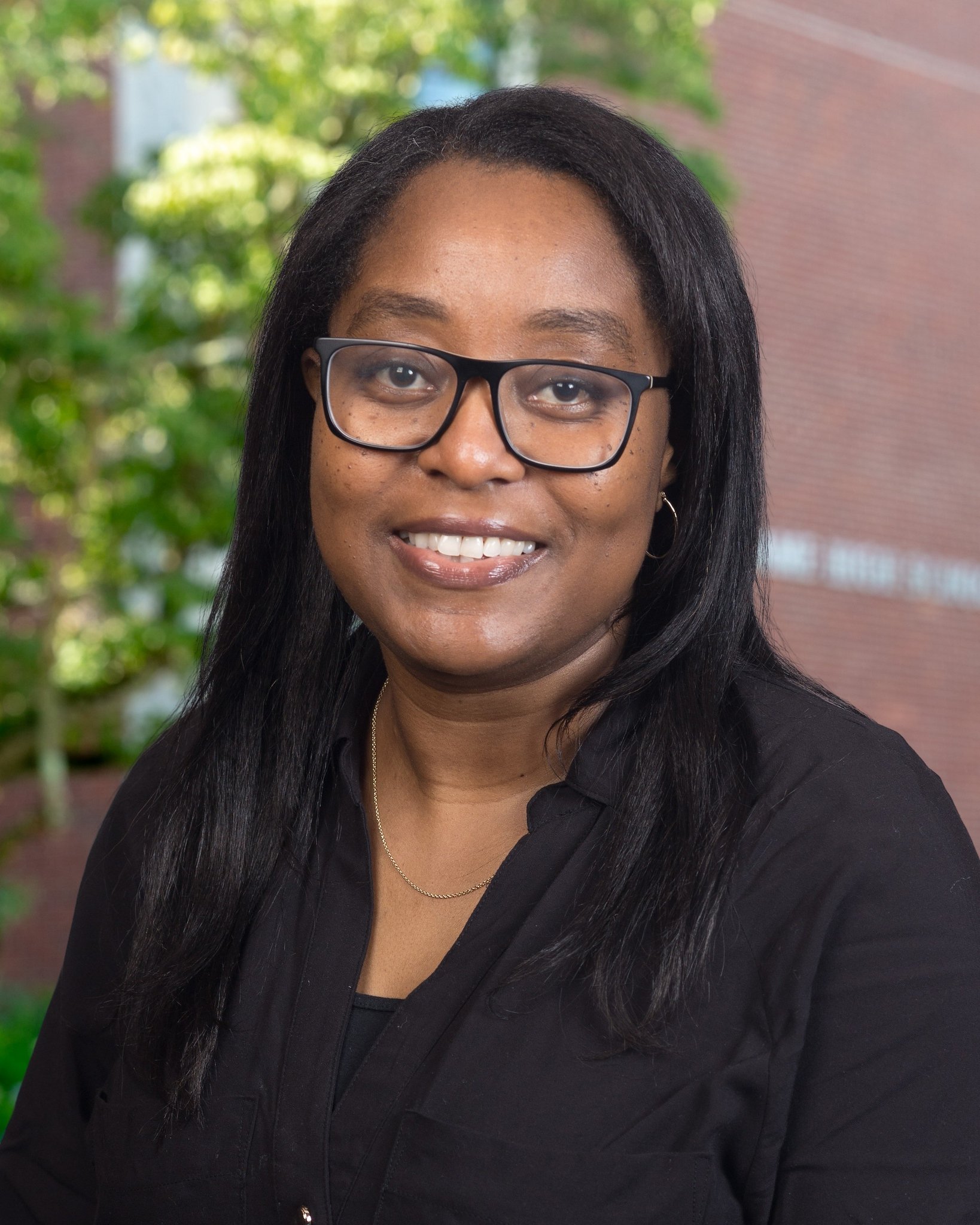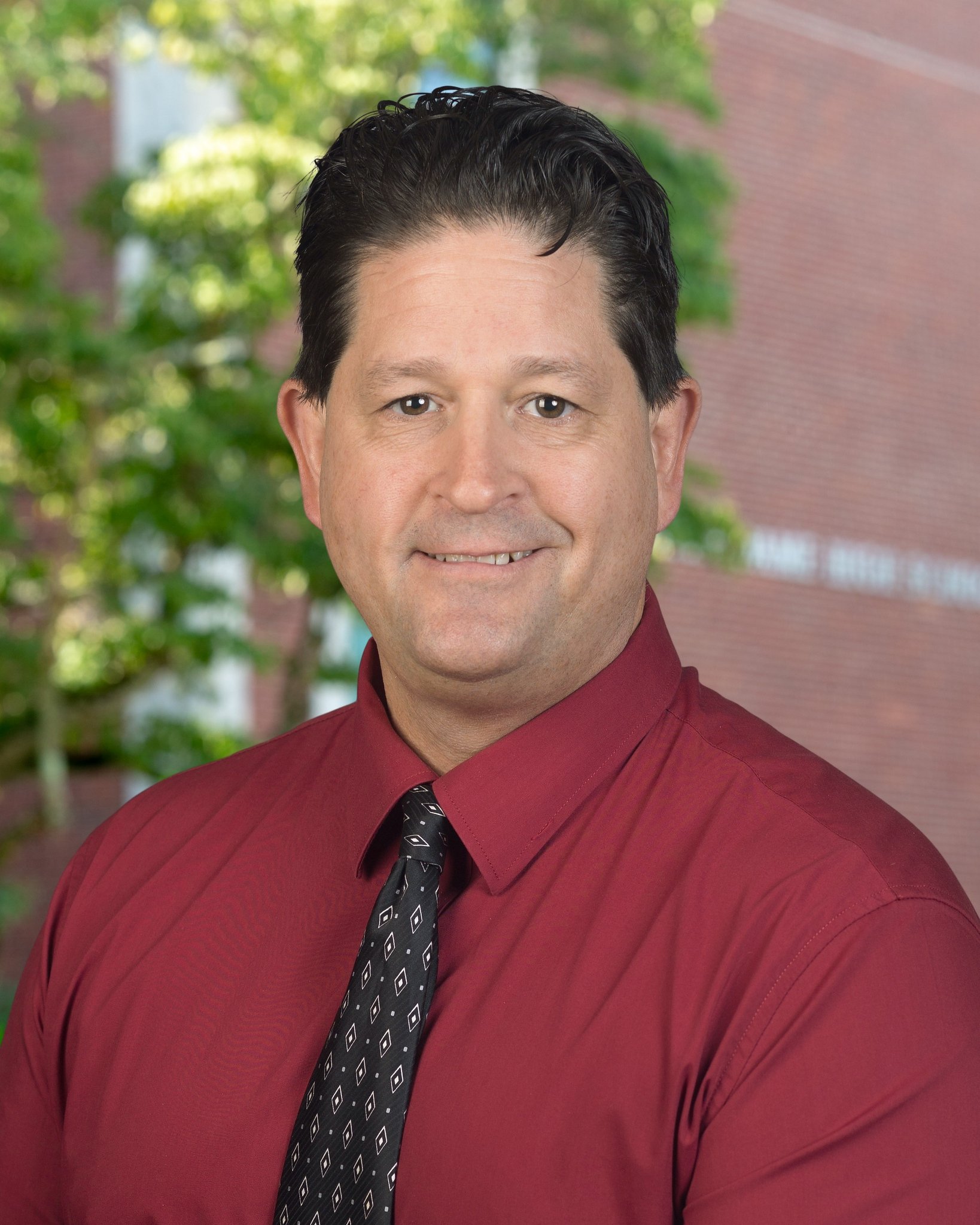Science Department
The mission of the Science Department is to provide each student with the 21st century skills necessary to understand and explain current events, scientific phenomena, and scientific and technological advances using critical thinking and problem-solving skills so that they may be an informed global citizen.

Mrs. Coluccio holds a B.S. in Astronomy and Astrophysics and an M.S. in Space Science, both from the Florida Institute of Technology.
In her free time, she enjoys playing video games, hiking, geocaching, running, cooking, and learning Italian. She also loves spending time with her son, Thomas. Fun facts about Mrs. Coluccio: She was the valedictorian of her high school class and has been skydiving!
academic overview
Science Courses for 2024-2025
*Based on a student’s final grade in his or her classes, it is possible to move into different pathways

Honors Conceptual Physics – #S113A/B 1 Credit Level 3 NCAA
The goals of conceptual physics honors are to give students a common foundation of science skills, and to provide them with the tools necessary to be able to understand, explain, and apply the basic concepts of how objects interact and move in the real world. The course explores how to think like a scientist, how forces interact, the energy within a system, and how different waves act. We will moderately discuss the mathematics involved in addition to the real-world applications of each topic. Requirements for placement: Previous record, placement into Level 3 Math courses, and signature of school counselor.
Conceptual Physics – #S112A/B 1 Credit Level 2 NCAA
The goals of conceptual physics are to give students a common foundation of science skills, and to provide them with the tools necessary to be able to understand, explain, and apply the basic concepts of how objects interact and move in the real world. The course explores how to think like a scientist, how forces interact, the energy within a system, and how different waves act. We briefly touch on the mathematics involved in each of these topics with a heavier focus on the ideas involved in these topics. Requirements for placement: Placement into Level 2 Math class.
Conceptual Physics – #S111A/B 1 Credit Level 1 NCAA
The goals of conceptual physics are to give students a common foundation of science skills, and to provide them with the tools necessary to be able to understand, explain, and apply the basic concepts of how objects interact and move in the real world. The course explores how to think like a scientist, how forces interact, and the energy within a system. This course highly emphasizes the ideas of physics, with a very limited use of mathematics. Requirements for placement: Placement into Level 1 Math class.
Honors Chemistry – #S33A/B 1 Credit Level 3 NCAA
This Chemistry course is designed to provide students with a foundation in more advanced topics in chemistry. It seeks to provide a strong background in the fundamentals of theory and lab work and provide difficult problem-solving situations to build on 21st century skills. The general topics include, but are not limited to, atomic theory, chemical bonding, chemical reactions, stoichiometry and kinetics. Requirements for placement: Minimum grade of 85 in Honors Conceptual Physics OR a minimum grade of 90 in Conceptual Physics; concurrent enrollment in or completion of Honors Algebra II; signature of Chemistry teacher.
Chemistry – #S32A/B 1 Credit Level 2 NCAA
This course is designed to introduce students to the fundamentals of chemistry. The main goal of this course is to provide students with problem-solving opportunities that build on critical thinking and literacy skills. The general topics include but are not limited to, atomic theory, chemical bonding, chemical reactions, and stoichiometry. Requirements for placement: Completion of Conceptual Physics.
Chemistry – #S31A/B 1 Credit Level 1 NCAA
This course introduces students to the basic concepts of chemistry. The goal of the course is to help students apply their understanding of properties of different substances to the real world. Topics include atomic structure, the periodic table, chemical bonding, and chemical reactions. Requirements for placement: Completion of Conceptual Physics; signature of counselor.
Biology – #S22A/B 1 Credit Level 2 NCAA
This course is designed to acquaint the student with selected topics from the areas of traditional and modern biological science. Students are introduced to theoretical concepts and practical applications of biology. Discussion and laboratory work are the major components of the course. Requirements for placement: Completion of Chemistry.
Biology – #S21A/B 1 Credit Level 1 NCAA
This course is designed to acquaint the student with selected topics from the areas of traditional and modern biological science. Students are introduced to theoretical concepts and practical applications of biology. Discussion and laboratory work are included in the course. Requirements for placement: Completion of Chemistry; signature of school counselor.
Honors Biology – #S23A/B 1 Credit Level 3 NCAA
This course is designed to develop critical thinking, making observations and formulating ideas about biological phenomena and is for students of above average ability and achievement. The main goal of this course is to build on the skills of biology along with development and ownership of their learning and prepare the students for intensity of advanced level science courses. The content is the same as Biology Level 2, but with more detail of cellular biology and genetic regulation. In addition, students will increase their lab, critical thinking, and reasoning skills through inquiry-based learning. Requirements for placement: Minimum grade of 85 in Honors Chemistry OR a minimum grade of 90 in Chemistry; signature of Honors Biology teacher.
ECE Biology – #S24A/B 1 Credit Level 4 NCAA
This level 4 course is designed to further develop skills such as critical thinking, making observations, and formulating ideas about biological phenomena. The main goal of this course is to further develop student ownership of their learning and time management. This course emphasizes how molecules are incorporated into cellular structures and the role biotechnology serves in science and our current society. The purpose of this course is to enable students to earn four (three class and one lab) credits from the University of Connecticut in the course BIOL 1107: Principles of Biology I and to further develop critical thinking and reasoning skills through inquiry-based learning.
Biology L4 is a UConn approved course. Requirements for placement: 90 overall average or better; minimum grade of 90 in Honors Chemistry; signature of Biology L4 teacher.
AP Chemistry – #S34A/B 1 Credit Level 4 NCAA
This introductory college-level chemistry course provides students with the foundational knowledge that’s required for more advanced coursework in chemistry. Students will develop their understanding of chemistry through inquiry-based investigations. Topics of study include but are not limited to, intermolecular forces and bonding with chemical reactions, acids and bases, kinetics, thermodynamics, and equilibrium. In addition, this course prepares students to take the College Board’s AP Chemistry exam after completion of the course. Requirements for placement: Minimum grade of 88 in Honors Chemistry and Honors Algebra II, OR a minimum grade of 90 in Chemistry and Algebra II; signature of AP Chemistry L4 teacher.
AP / ECE Physics – #S84A/B 1 Credit Level 4 NCAA
In this course, students cultivate their understanding of physics through classroom study, in-class activity, and hands-on, inquiry-based laboratory work as they explore concepts like systems, fields, force interactions, change, conservation, and waves. The purpose of this course is to enable students to earn credit from the University of Connecticut in the course PHYS 1201Q: General Physics I. Students will also be prepared to take the College Board’s AP Physics 1 exam upon completion of the course. The course is algebra-based, and relies on the use of geometry and trigonometry.
AP Physics L4 is a UConn approved course, as well as an AP course. Requirements for placement: Minimum grade of 85 in Conceptual Physics OR minimum grade of 80 in Honors Conceptual Physics; minimum grade of 80 in Honors Algebra II, Honors Geometry, and Honors Trigonometry; signature of AP Physics L4 teacher
Anatomy & Physiology – #S52A/B 1 Credit Level 2 NCAA
This course is designed to introduce students to the basic patterns of human development and organizational themes. The goal of this course is to present the material through a variety of class presentations, practicals, discussions, and laboratory work to logically interpret the function of body systems. Students will increase their lab and critical thinking, and reasoning skills through inquiry-based learning. This course emphasizes anatomy, physiology, and pathology. Requirements for placement: Minimum grade of 80 in Biology and Chemistry, OR minimum grade of 78 in Honors Biology and Honors Chemistry; signature of Anatomy & Physiology teacher
Astronomy – #SS15A 0.5 Credit Level 2
The goal of the astronomy course is to introduce students to the composition and structure of the Universe, and provide students with a study of the Universe and the conditions, properties, and motions of bodies in space. The content includes, but is not limited to, historical astronomy, astronomical instruments, the celestial sphere, the solar system, the Earth as a system in space, the Earth/Moon system, the Sun as a star, and stars. Algebra and Geometry will be used. Requirements for placement: Completion of Geometry; minimum grade of 80 in Chemistry and Conceptual Physics, OR minimum grade of 78 in Honors Chemistry and Honors Conceptual Physics; signature of Science Department Chairperson
Infectious Disease – #SS16A 0.5 Credit Level 2
This course is designed to introduce students to the field of infectious diseases and how pathogens play a role in our global community both medically and socially. The main goal of this course is to further develop student ownership of learning and time management. The content of this course will cover the history of pathology, epidemiology and outbreak modeling, viral and bacterial pathogenesis, drug development and vaccine design. In addition, students will increase their lab, critical thinking and reasoning skills through inquiry-based learning and presenting their findings to their peers.
Requirements for placement: Minimum grade of 80 in Biology and Chemistry, OR a minimum grade of 78 in Honors Biology and Honors Chemistry; signature of Biology teacher.
Marine Ecology – #S42A 0.5 Credit Level 2 NCAA
This one semester course of study will provide an opportunity to investigate the unique nature of marine life. The main goal of Marine Science is to understand the physical and chemical characteristics of the oceanic world and to understand the unique adaptations of the diverse marine life that thrives in each life zone. The purpose of this course is to investigate 21st century problems including: decline of fisheries, overfishing, plastic plague in our oceans, and how climate change is impacting the world shellfish industry. A critical part of this course involves participating in a intertidal zone field study in Westerly, RI at Napatree point which includes species sampling invertebrates using Quadrats along transect lines and seining for vertebrates. Requirements for placement: Junior or senior status; signature of Marine Ecology teacher.
Forensic Science – #S92A 0.5 Credit Level 2 NCAA
This course is designed to introduce students to the variety of disciplines involved in Forensic Science. The goal of the course is to integrate various sciences to solve crimes while making sense of complex problems that invoke logical reasoning, critical thinking, and inductive and deductive reasoning skills. The purpose of this course is to increase students’ lab, critical thinking, and reasoning skills through inquiry-based learning and by presenting their findings to their peers via mock trials. In addition, this course will induce students to use common sense and use comparative analysis to solve complex problems. Requirements for placement: Junior or senior status; signature of Forensic Science teacher.
Science Internship – #S90A 0.5 or 1.0 Credit Level*
This internship is designed to offer students the opportunity to serve as an assistant to science teachers in preparing and teaching laboratories for their courses throughout the year. Responsibilities will include coordinating with science teachers in the areas of lab preparation, cleanup, acting as a teacher’s assistant during labs, and other duties that help the department operate smoothly. Students must be willing to make a commitment to this internship and may be asked to extend their duty time to include community period or after school, as necessary.
Requirements: Senior status: minimum grade of 80 in Conceptual Physics, Chemistry, and Biology; signature of Science Department Chair
IB Sciences
IB Biology (HL) 1
IB Biology (HL) is a two-year course that teaches students to become aware of how scientists work and communicate with each other. While the scientific method may take on a wide variety of forms, the emphasis is on a practical approach. In addition, through the overarching theme of the “Nature of Science” knowledge and skills will be put into the context of the way science and scientists work in the 21st Century and the ethical debates and limitations of creative scientific endeavor. Students have opportunities to design investigations, collect data, develop manipulative skills, analyze results, collaborate with peers and evaluate and communicate their findings. The investigations may be laboratory based or they may make use of simulations and data bases. IB Biology I concentrates on overarching concepts that connect all aspects of Biology, Microscopy, Cells, and Cell Processes, Cellular Respiration and Photosynthesis, an introduction to Molecular Biology, and DNA and Mendelian Genetics. Students will begin the practical interdisciplinary Group 4 project component of the Internal Assessment.
Requirements for placement: Must be enrolled as an IB student.
IB Biology (HL) II
IB Biology (HL) II is a continuation of IB Biology I in which students continue to explore the way science and scientists work in the 21st century and develop the skills to work independently on their own design and collaboratively to mirror the way in which scientific research is conducted in the wider community. IB Biology II concentrates on Genetic Technology, Evolution, Plant Structure and Function, Human Body Systems, and Ecology. Students will complete the Group 4 project component of the Internal Assessment, short-term and long-term experiments and investigations, and prepare for IB external assessments for May of senior year. Requirements for placement: Must be enrolled as an IB student.
IB Physics
The goal of the IB Physics course is to help students better understand and explain physical phenomena in the natural world and give them the ability to apply this knowledge to solve real-world problems. This course will develop a deep understanding of physics concepts using algebra and trigonometry. Topics of study include measurements and uncertainties; mechanics; engineering physics; thermal physics; waves; electricity and magnetism; circular motion and gravitation; atomic, nuclear, and particle physics; and energy production. Students will learn material through discussion, quantitative studies, and hands-on activities and labs and prepare for IB internal and external assessments. Requirements for placement: Must be enrolled as an IB student.
IB Design Technology (SL/HL) I
Design Technology is the study of how the development of new technologies has given rise to profound changes in society: transforming how we access and process information; how we adapt our environment; how we communicate with others; how we are able to solve problems; how we work and live. Design is the link between innovation and creativity, taking thoughts and exploring the possibilities and constraints associated with products or systems, allowing students to redefine and manage the generation of further thought through prototyping, experimentation, and adaptation. Students learn key skills in conceptual modeling, graphic modeling using CAD, basic circuitry and soldering, and the use of power tools. Additionally, students learn how to do material selection and analysis, basic computer programming, and hone their presentation skills. Students will begin the Internal Assessment component, which is called the Design Project. This component exposes them to research and writing in the field of engineering and design and is continued in the IB Design Technology Year 2 course. Students who are interested in an engineering pathway and the International Baccalaureate program can take this two-year long course. Requirements for placement: Two-year course. Must be enrolled as an International Baccalaureate student and completed one foundation engineering course (Introduction to Engineering Design and/or Principles of Engineering) or permission of engineering teacher.
IB Design Technology (SL/HL) II
This course is a continuation of IB Design Technology Year 1 and is focused on the continued immersion in the Design Cycle, and the development of the necessary hard and soft skills required to complete the Design Project, which allows a wide range of contexts to be explored through the varying material disciplines of design technology, including product design, fashion design/textiles, electronic product design, and robotics. Students produce a purposeful research question and the rationale for it. Students then carry out an analysis of a design opportunity, conceptual designs, development of detailed design plan for the manufacture of a prototype and evaluate the success of the prototype against design specifications. Finally, students prepare for their external assessments taken in May of their senior year. Requirements for placement: Successful completion of IB Design Technology Year 1 and continued participation in the International Baccalaureate program.
Meet our Science Faculty

Carella Barrett-Rafala

Paul Campano

Liz Coluccio

Christopher McMullen

Brendan McGuire
Clubs and Extracirriculars
The ND Science Club is for students who are interested in exploring science through research projects. You can participate in various science fairs, join the Science National Honor Society, and possibly win university scholarships. There are potentially opportunities to work in a hospital or lab. Students can choose to study and research biology, chemistry, physics, or other scientific fields.
The Sci-fi Fantasy Club brings together students with interests in the genre of sci-fi. Students watch movies in the genre and come together to discuss them.
"Mr. McMullen takes biology to a new level. Every day we are learning about what we consider to be ordinary things and he shows us that life is extraordinary. We continue to take our learning in the classroom to a new level through labs and hands-on experiences, where we apply our knowledge to the real world."
- Reamon Curis, Class of 2025




